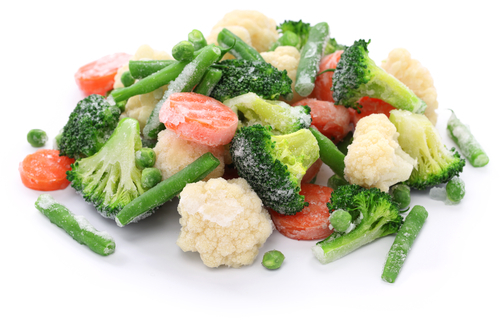Short answer
No, frozen vegetables are not bad for you. In fact, in many cases, they are better for you than fresh produce purchased at the supermarket. However, some bacteria can grow on frozen produce.
Recommended Alternative
Long answer
In the past, researchers speculated that frozen vegetables experienced nutrient breakdown faster than fresh produce during the freezing process. Tests have debunked this theory, proving that blanching and flash freezing vegetables when they are ripe preserves naturally occurring nutrients far longer than produce that you find in the bins at your local supermarket. It is important to point out that frozen vegetables that have been pre-seasoned may contain harmful additives and preservatives, such as monosodium glutamate (MSG), as well as excessive amounts of salt.
This is partly due to the natural aging process of food. When you pick a vegetable off the vine or pull it out of the ground, it immediately starts to decompose. Some produce lasts longer than others, but if the aging process is not halted by either placing the produce in the freezer or eating it right away, nutrient loss occurs. For example, fresh spinach loses half its folate (a nutrient that assists in DNA repair) after eight days.
In some cases, frozen vegetables are truly healthier than fresh vegetables. During off season—the time of year when produce does not grow locally, usually in winter—frozen vegetables still contain all the nutrients that you want to find in the middle of harvest season. During off-season, produce is picked from their respective plants, in countries from South America, where the seasons are opposite to ours in the U.S. However, because of the long journey, the produce is picked before it is ripe, forcing it to ripen on the journey or in your store, losing many of its nutrients by the time you purchase it.
Frozen vegetables are always picked at peak ripeness. They are then blanched, or placed in hot water for a moment to kill bacteria and the enzymes that break down food. They are then flash frozen (frozen instantly) and packaged. When kept at the correct temperature, these vegetables do not suffer from the long journey from farm to table. By the time you cook your frozen vegetables, you have lost hardly any nutrients.
While frozen vegetables are a great solution to keeping up your nutrient intake in the middle of off-season, it is always healthier to pick your produce locally at peak ripeness and eat it as soon as possible. Also important to consider is that sometimes frozen vegetables can be exposed to the dangerous food-poisoning bacteria, listeria, which can grow in a frozen setting. In May-2016, there was a massive frozen fruit and vegetable recall after eight consumers contracted listeria after consuming frozen vegetables packaged in a CRF facility in Pasco, Washington. The recall affected 72 brands, both organic and non-organic. Full details of food based consumer recalls can be found on the Food and Drug Administration (FDA) website.
Possible short-term side effects
- illness from bacteria (unlikely)
Ingredients to be aware of
- various additives / preservatives (if pre-seasoned)

Benefits
- preserves nutrients of fresh vegetables
- low in fat and sodium
- healthy blood pressure, cholesterol levels
- healthier immune system
- healthier heart
- boosts the immune system
- a source of vitamins
- a source of fiber
Healthier alternatives
- eating vegetables ripe off the vine locally
Our Wellness Pick (what is this?)
Organic Mixed Berry Bar
- USDA Organic certified
- Convenient snack
- Rich in berry flavors
- Non-GMO ingredients
- 6-bar pack
 Approved by
Approved by 















